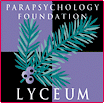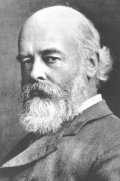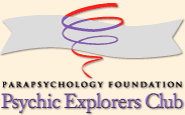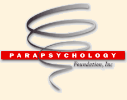 |
 |
| Richet was known to be skeptical about the possibility of survival of death. His objections centered on the dependence of consciousness and functions such as memory on the nervous system, and his belief that veridical statements by mediums could be explained through the working of the living medium’s cryptesthesia (e.g., Richet, 1923, 1924a). Regarding the latter, he wrote: “Cryptesthesia comes into play without any necessity for supposing that a discarnate human being is speaking by the voice or writing by the hand of the medium” (1923, p. 610). In his writings Richet repeatedly stated that he was not impressed by changes of personality shown by mediums. He accounted for them by the personification abilities of the human mind, a topic he explored in the hypnotized during the 1880s (Richet, 1883). As he wrote years later: The queerest personalities can easily be evoked by hypnotic suggestions. The only difference between the somnambule and the medium is that while the actions of the former are due to the verbal suggestion of the magnetizer, those of the latter are due to an auto-suggestion whose origin is unknown. Since it is impossible to accept as authentic the childish personifications of common hypnotism, why should we accept those that are a little more perfect? … The ease and frequency with which factitious personalities are produced renders the production of real personifications very doubtful (Richet, 1923, pp. 609–610). However, Richet was impressed by some phenomena. As he wrote about the death-bed visions of children: They are much more explicable by the spirit-hypothesis than by that of cryptaesthesia. It even seems to me that among all the facts adduced to prove survival, these are the most disconcerting … Nevertheless despite their spiritoid appearance these facts are not sufficient to make me infer that the consciousness of deceased persons appears as a phantom at the death of a relative (Richet, 1924b, p. 276).  Oliver Lodge (1936) said that in private Richet “confessed to me that he was sometimes nearly bowled over by the evidence; but, on the whole, he adhered to his lifelong conviction of the materialistic aspect of the universe” (p. 4). While the evidence is not clear regarding the claim that Richet became convinced of survival of death during his last years of life, there are indications that his thinking became less physiologically and materialistically-oriented. Oliver Lodge (1936) said that in private Richet “confessed to me that he was sometimes nearly bowled over by the evidence; but, on the whole, he adhered to his lifelong conviction of the materialistic aspect of the universe” (p. 4). While the evidence is not clear regarding the claim that Richet became convinced of survival of death during his last years of life, there are indications that his thinking became less physiologically and materialistically-oriented.
In his book La grande espérance (1933) Richet stated that he saw metapsychics as the great hope of humanity. This was further developed in his book Au secours!, published the year he died (1935). In this work he said that the “inhabitual,” or psychic phenomena, were very important for the future of humanity. The inhabitual, he wrote, “will have a place in science … A new moral ideal will be the consequence, but not the basis of this new science” (p. 103). Richet sent La grande espérance both to Ernesto Bozzano and to Oliver Lodge, who defended non-physical ideas of humankind, as well as the possibility of survival. Both men were assured by Richet that he was approaching their way of thinking (Bubb, 1936; Lodge, 1936). Bubb, E.M. (1936, May 30). Richet accepted survival before he “died.” Psychic News, p. 7. Lodge, O. (1936). In memory of Charles Richet. Proceedings of the Society for Psychical Research, 44, 1–4. Richet, C. (1923). Thirty Years of Psychical Research. New York: Macmillan. (Translation of the second French edition of Traité de métapsychique) Richet, C. (1924a). For and against survival: The difficulty of survival from the scientific point of view. Proceedings of the Society for Psychical Research, 34, 107–113. Richet, C. (1924b). Metapsychic science and survival. Journal of the Society for Psychical Research, 21, 274–278. Richet, C. (1933). La grande espérance. Paris: Montaigne. Richet, C. (1935). Au secours! Paris: J. Peyronnet. |
 |

|
 www. parapsychology. org |
||